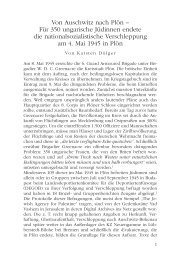The Kallos Family Book 2022
Always remember and tell the story to the world
Always remember and tell the story to the world
- TAGS
- barbara lorber
You also want an ePaper? Increase the reach of your titles
YUMPU automatically turns print PDFs into web optimized ePapers that Google loves.
14 • THE KALLOS FAMILY
Slovakia, Romania’s northern Transylvania, and
the Backa region of the former Yugoslavia, all
territories lost by Hungary in World War 1 and
re-occupied by Hungary with the help of Nazi
Germany during World War 2.
Overnight, Hungarian replaced Czech and
once again became the official language of the
area: school was taught in Hungarian, all documents
and official records were in Hungarian,
and the town’s name and street names reverted
to their pre-World War 1 Hungarian names.
Accordingly, Ťačovo, for example, became Técső
again and Hlavní ulica, the town’s main street,
reverted to Fő utca. The Kallos Hotel changed
address from Nádražní ulica to Vasút utca and
later to Mehalyi Gabor utca. In terms of currency,
the Hungarian pengő replaced the Czech
koruna. From this point onwards the Czech Jews
of Sub Carpathian Ruthenia were referred to as
Hungarian Jews.
Hungarian rule saw more incidents of
antisemitism, mainly perpetrated by the
large local Hungarian population, still bitter
about their substantial territorial and population
losses suffered as a result of Hungary’s
breakup after World War 1, which was blamed
on the Jews. Anti-Jewish laws passed by Miklós
Horthy, Regent of Hungary, imposed severe
limits on Jewish professional and business life.
Some Jewish families suffered financial ruin
and poverty during the Hungarian occupation
while others managed to keep their businesses
running, either through bribing local officials or
loopholes in the restrictions.
Biri recalls that although Hungarian rule
brought changes for her life, overall, ‘life went
on as usual’. Zoltan had good relations and connections
with the Hungarians and so was able to
continue to run his hotel without interference.
He always invited the gendarmes patrolling in
pairs outside his hotel to come in for a free beer
or wine.
To his credit, Horthy, despite constant pressure
from Germany, refused to deport Hungarian
Jews to extermination camps, postponing for a
time the Nazi ‘Final Solution’ to the ‘Jewish Question’.
In this way about 760,000 Jews in Greater
Hungary, including Técső, were protected while
the Holocaust was in full operation in the rest of
Europe. Instead, as one of his anti-Jewish measures,
Horthy established the unique Hungarian
Labor Service. Jewish men in Greater Hungary
aged between 18 and 42 years were conscripted
as virtual slave labourers into the Hungarian
army where, under the command of Hungarian
antisemites, they were often subjected to
extreme cruelty, abuse and humiliation. Only a
small percentage survived. Biri recalls her father
was drafted to the Labour Battalion stationed at
Mátészalka in the Hungarian motherland, west
of Técső. Here, Zoltan performed backbreaking
construction work in harsh conditions with
little food. It was nerve wracking for Zoltan’s
family while they waited for his return. On one
Friday night when her father was absent from
the Shabbat table, Biri cried bitterly; she was
inconsolable. Fortunately, Zoltan came home a
few months later, well before June 1941 when
Hungary joined Germany as its ally in the invasion
of the Soviet Union. Tens of thousands of
Jewish conscripted slaves died on the dreaded
Eastern Front.
After returning from Chust at the end of 1938
Biri continued her schooling in Técső at the
Hungarian middle school opposite her family’s
hotel. It was called polgári iskola (literally, ‘civil
school’ in Hungarian). Biri, gifted in languages,
also studied German as well as her other subjects;
she was so fluent that her teacher, who
was busy with her own family, which included





